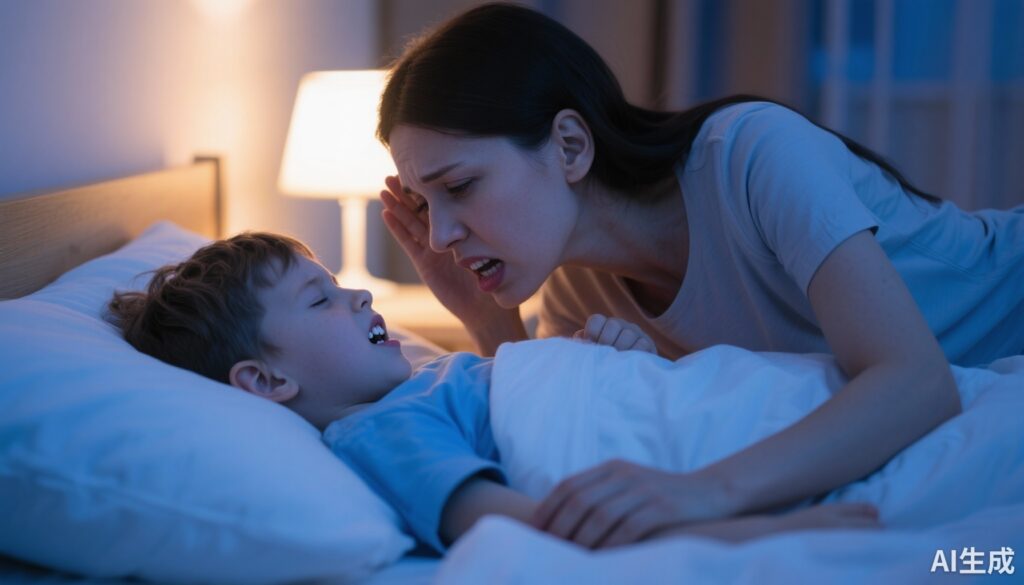Introduction: The Mystery of Nighttime Teeth Grinding in Children
Many parents have noticed an unusual, loud “grinding” or “crunching” noise coming from their children’s bedrooms at night. This sound, resembling a mini “rock concert” of teeth, can understandably cause concern. What is happening when a child grinds their teeth while they sleep? Known medically as bruxism, nighttime teeth grinding is a fairly common phenomenon in children. While seemingly harmless, persistent grinding can affect dental health and overall well-being, making it a subject warranting deeper understanding.
The Importance of Teeth in Children
Before delving into bruxism, it’s essential to appreciate the role teeth play. They are critical for:
– Chewing and breaking down food for digestion
– Assisting in clear speech
– Supporting the shape and structure of the face
Under normal conditions, teeth work by day and rest by night; the upper and lower teeth maintain a safe distance when the mouth is closed, preventing wear and tear. However, in children with bruxism, the brain seems to send the wrong signals, instructing the jaw muscles to contract involuntarily during sleep. This results in intense grinding and clenching without food acting as a cushion, potentially causing damage—the hallmark of nighttime bruxism.
What Causes Brain “Miscommunication” Leading to Bruxism?
Nighttime teeth grinding is primarily about involuntary muscle activity triggered by the brain; but what causes this erroneous signal? Scientific and clinical observations identify multiple factors.
1. Physiological Factors: Special Periods of Development
Children experience several phases where their teeth and gums undergo significant changes. The eruption of primary (baby) teeth, the transition to permanent teeth, and periods of tooth loss constitute stressful times for the oral tissues. During these phases, gums may feel swollen, itchy, or uncomfortable, leading the brain to misinterpret signals and causing temporary disruptions in bite coordination. Bruxism here acts as a normal response to these transitional periods.
2. Malocclusion or Bite Problems
Improper alignment of teeth or misfit of the bite can create discomfort during jaw closure. This may happen when new teeth emerge before old teeth fall out, leading to a double row of teeth, crooked teeth, or habitual chewing on one side. The brain may try to “correct” the unpleasant feeling by stimulating teeth grinding at night.
3. Physical Health Imbalances
Several bodily health issues can play a role:
– Digestive disturbances: Late or heavy dinners, intake of hard-to-digest foods, or late-night snacking keep digestive organs active during sleep. This persistent activity may signal the brain, which in turn triggers jaw muscles.
– Nutrition deficiencies: Poor diet causing calcium, vitamin D shortages can increase nerve and muscle excitability, predisposing children to grinding.
– Respiratory and allergic conditions: Nasal congestion from rhinitis, enlarged tonsils or adenoids may disrupt normal breathing. Bruxism might be a mechanism the body uses during sleep to adjust airway patency.
– Neurological or hormonal imbalances: Abnormal levels of neurotransmitters such as dopamine or norepinephrine can disrupt neural regulation, leading to nighttime muscle hyperactivity.
– Sleep disorders: Conditions like obstructive sleep apnea or parasomnias (e.g., sleepwalking, sleep talking) can trigger protective reflexes including grinding.
– Parasites: Historically, intestinal worms such as roundworms were linked to teeth grinding, possibly due to toxins irritating the brain. Improved hygiene today has made this a rare cause.
4. Emotional and Psychological Stress
A child’s emotional life can be turbulent even from a very young age. Separation anxiety begins as early as six months. Toddlers use crying to express needs, preschoolers develop emotion words but may show aggression or tantrums. Older children face academic and social pressures.
Unresolved daytime stress, anxiety, or fatigue can manifest at night as altered brain signals leading to bruxism. Excessive stimulation before bedtime without calming can also elevate brain activity, prompting grinding.
5. Genetic Factors
Family history plays a significant role. Children whose parents grind their teeth are at increased risk, likely due to genetic variations influencing muscle control and neural pathways. Current research suggests multiple genes are involved rather than a single gene mutation.
6. Other Contributing Factors
Sleeping posture, especially prone (face-down) or side positions, may exert pressure on the jaw joints and muscles, inadvertently provoking grinding. Insufficient sleep duration, habits like nail-biting or chewing objects, and underlying behavioral or psychological issues can also contribute.
Common Misconceptions About Children’s Teeth Grinding
Parents often have misconceptions such as:
– Assuming bruxism is always harmful and requires urgent dental intervention
– Believing it is caused solely by bad habits or psychological problems
– That it always persists into adulthood
These misunderstandings may lead to undue anxiety or improper management.
Illustrative Case: Understanding Bruxism Through Emily’s Story
Emily, a six-year-old girl, began grinding her teeth at night following the loss of her front baby teeth and arrival of permanent teeth. Her mother reported loud grinding noises and occasional jaw discomfort.
Emily’s pediatric dentist explained that her bruxism was likely related to the “special period” of dental transition, combined with recent anxiety about starting school. With reassurance, improved sleep hygiene, and mild stress management, Emily’s symptoms gradually resolved over months without medication or dental appliances.
Best Practices for Managing Pediatric Bruxism
Most cases can be managed with conservative measures:
– Regular dental check-ups: Monitoring bite and tooth wear to determine if intervention is needed
– Good sleep hygiene: Establishing calming bedtime routines and sufficient sleep hours
– Balanced diet: Avoid heavy or late meals, and ensure adequate nutrition
– Stress reduction: Encouraging emotional expression, relaxation techniques, and addressing anxiety
– Posture advice: Avoid prone sleeping if it causes jaw discomfort
Severe cases with tooth damage or associated conditions may require occlusal guards or consultation with specialists.
Expert Insights
Dr. Amanda Lewis, pediatric dentist, advises, “Parents should not panic if their child occasionally grinds teeth at night, especially during dental transitions. Most children outgrow it. However, persistent, loud grinding or complaints of pain warrant professional evaluation to prevent complications. Multi-factorial causes mean treatment should be individualized.”
Conclusion
Nighttime teeth grinding in children, or bruxism, is a complex behavior influenced by physiological growth phases, dental misalignments, health status, emotional factors, genetics, and lifestyle. While usually benign and self-limiting, awareness and understanding can help parents and professionals manage it effectively, minimizing potential harm and discomfort.
Ongoing research continues to unravel its intricate neurological and environmental interactions, promising improved interventions. For now, a balanced, holistic approach focusing on dental health, emotional well-being, and sleep quality remains the cornerstone of care.
References
1. Lobbezoo F, et al. Bruxism defined and graded: an international consensus. J Oral Rehabil. 2013;40(1):2-4.
2. Manfredini D, et al. Epidemiology of bruxism in children and adolescents: A systematic review. Sleep Medicine Reviews. 2013;17(8): 19-24.
3. Ghanim A, et al. Association between sleep bruxism and obstructive sleep apnea syndrome: A systematic review and meta-analysis. Sleep Medicine Reviews. 2018;37: 53-62.
4. American Academy of Pediatric Dentistry. Guideline on management of pediatric bruxism. Pediatr Dent. 2023;45(6):145-150.
5. Silva A, et al. The influence of stress and anxiety on children’s sleep bruxism. Sleep Sci. 2020;13(4):280-285.



